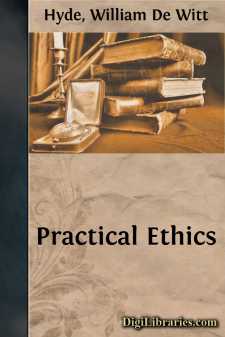Categories
- Antiques & Collectibles 13
- Architecture 36
- Art 48
- Bibles 22
- Biography & Autobiography 813
- Body, Mind & Spirit 142
- Business & Economics 28
- Children's Books 17
- Children's Fiction 14
- Computers 4
- Cooking 94
- Crafts & Hobbies 4
- Drama 346
- Education 46
- Family & Relationships 57
- Fiction 11829
- Games 19
- Gardening 17
- Health & Fitness 34
- History 1377
- House & Home 1
- Humor 147
- Juvenile Fiction 1873
- Juvenile Nonfiction 202
- Language Arts & Disciplines 88
- Law 16
- Literary Collections 686
- Literary Criticism 179
- Mathematics 13
- Medical 41
- Music 40
- Nature 179
- Non-Classifiable 1768
- Performing Arts 7
- Periodicals 1453
- Philosophy 64
- Photography 2
- Poetry 896
- Political Science 203
- Psychology 42
- Reference 154
- Religion 513
- Science 126
- Self-Help 84
- Social Science 81
- Sports & Recreation 34
- Study Aids 3
- Technology & Engineering 59
- Transportation 23
- Travel 463
- True Crime 29
William De Witt Hyde
William De Witt Hyde (1858–1917) was an American philosopher and educator, best known for serving as the president of Bowdoin College from 1885 to 1917. He authored several works on ethics, religion, and education, including "The College Man and the College Woman" and "Practical Ethics." Hyde was a proponent of liberal arts education and believed in developing well-rounded individuals through a balance of intellectual and moral growth. His work "The Five Great Philosophies of Life" remains one of his most influential contributions, exploring major ethical systems.
Author's Books:
Sort by:
THE LONDON SUNDAY This seems to be a thing that all exclaim against, and but few see. The phrase is never varied—a sure sign of lack of experience. One cries, ‘Oh, the London Sunday!’ and another, ‘It must be too dreadful for foreigners!’ and before the topic disappears something yet vaguer has been said, in a flickering manner, as to the Boulevards. But in fact London Sunday is little...
more...
Ethics is the science of conduct, and the art of life. Life consists in the maintenance of relations; it requires continual adjustment; it implies external objects, as well as internal forces. Conduct must have materials to work with; stuff to build character out of; resistance to overcome; objects to confront. These objects nature has abundantly provided. They are countless as the sands of the...
more...



